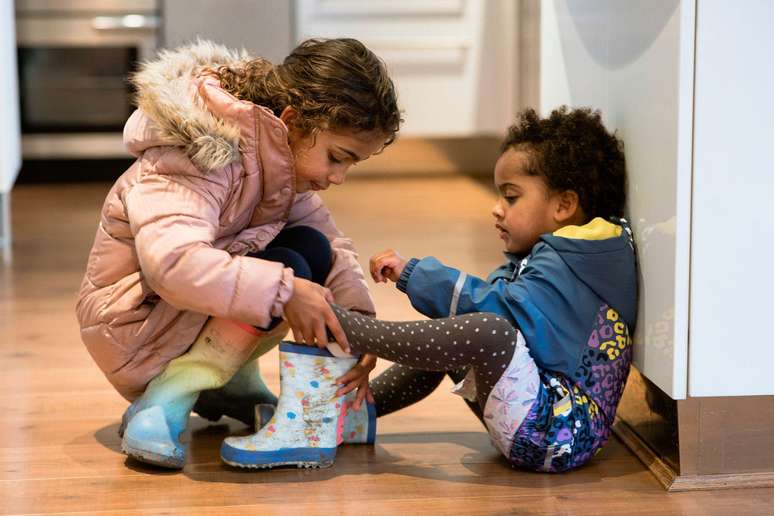How Being the Oldest, Middle, or Youngest Child Shapes Your Personality

As the oldest child, I often identify with the stereotypical characteristics associated with the oldest sibling: responsible, caring, perfectionist. My mother is also the oldest child, and she shares these traits.
My younger sister, on the other hand, is a little more laid-back — although we grew up in the same house, with the same parents, and are close, our personalities are quite different.
I wondered if this difference could be due to our birth order — is there any science behind the idea that being the oldest child, the youngest child, or an only child shapes who we are and how we deal with the world?
A century-old mysteryDespite fascinating the scientific community and families for more than a century, the question of whether birth order among siblings shapes our personality is still a matter of debate.
Historically, surveys have yielded inconsistent results. There are several reasons for this, but to put it simply: it’s hard to measure.
Rodica Damian, a psychology professor at the University of Houston, explains that previous studies have typically included small sample sizes. Additionally, because personality tests are often self-reported, they can be subject to bias.
Recent studies indicate that a number of confounding variables can make it difficult to investigate whether birth order is systematic — that is, whether it affects all people in the same way.
The total number of siblings, for example, might be a factor: one would expect the overall dynamics to be different in a family with two siblings compared to a family with seven siblings.
Being the oldest or youngest child in these different sized families can be a very different experience, and not directly comparable.
Family size and the experience of being a child in a given family can, in turn, be related to many other factors, such as the family's socioeconomic status — wealthier families with higher socioeconomic status tend to have fewer children, for example.
Additionally, there is the person's age and gender, which can influence their experience within and outside the family.
Given this context, researchers have not been able to conclude that birth order has any consistent, universal impact on our personalities. But that doesn't mean birth order is irrelevant. It may play a role in certain families or cultures.
"I think people have a lot of beliefs that are kind of outdated or never really were," says Julia Rohrer, a personality researcher at the University of Leipzig in Germany.
"For example, 'eldest daughter syndrome' is a significant one — it's clear that women often still have different roles, and are expected to provide more care. And firstborns are still expected to care for their younger siblings," she adds.
"For some women, this may perfectly match their experience, but for others it may not, because every family is different."
In other words, not every oldest daughter will be responsible and caring — but for some, the idea of "oldest daughter syndrome" may ring true because they actually grew up having to care for younger siblings, and they feel that experience shaped them.
Rohrer and his colleagues found that birth order "does not have a lasting effect on general personality traits" after analyzing three large survey databases in the UK, US and Germany, each with data from thousands of people.
However, the study confirmed previous findings about the impact of birth order on one specific trait: intelligence.
Intelligence is a complex phenomenon, and the study measures it only in the form of performance on intelligence tests and self-reported intellect.
"We confirmed the effect that firstborns score higher on objectively measured intelligence, and furthermore, we found a similar effect on self-reported intellect," Rohrer and colleagues wrote in the study.
Previous research has documented that performance on intelligence tests "decreases slightly from firstborns to later-borns."

As for birth order and other personality traits, Rohrer says that reflecting on one's own experience can still be meaningful, even if there is no universal pattern:
"It provides a label where you can find other people who grew up in a similar situation, and you can exchange experiences and so on," she says of terms like "eldest daughter syndrome."
There's nothing wrong with framing your experience this way, "as long as you don't assume that experience is universal," she says.
Damian agrees: "While we don't find systematic differences in personality, that doesn't mean there aren't social processes within each family or within each culture that can lead to different outcomes based on birth order."
For example, the United Kingdom has a historical culture of primogeniture (which privileges men), meaning that the eldest son would be first in line to inherit the family's wealth, property or titles.
Only in 2013, with the approval of the Law of Succession to the Crown, did primogeniture within the monarchy come to an end, ending the power of a male heir to deprive an eldest daughter of her right to the Crown.
The idea of primogeniture is surprisingly widespread and persistent: in the hit HBO series Succession , about a family's struggle to take control of a media empire, a character shouts "I'm the oldest!" at the end.
He believes that his birth position gives him the right to take over his father's CEO role. (Actually, he's the second oldest son, but let's not get into that.)
"If social practice is based on birth order, then yes, birth order can affect your outcomes," says Damian.
Is age just a number?Age-related experiences can easily be mistaken for a personality trait or behavior influenced by birth order, the researchers explain. Take, for example, the case of the "responsible" older sibling.
"As people get older, they become more responsible, more self-controlled. So the firstborn is always going to be older than the last-born child, and as you watch your children grow up, the firstborn is always going to be more responsible," says Damian.
"Another thing is that people become more inhibited as they get older," she adds. "So the second child may seem more sociable and less neurotic, because a 10-year-old is much happier and full of himself... compared to a 14-year-old who is freaking out about everything. That's because they have different challenges."
Factors such as children's friendship circles are also important. Several studies suggest a link between delinquent peers and delinquent behavior, for example, so that an older child may be more likely to break rules depending on the people he or she spends time with.
Smart brothers

As mentioned earlier, a consistent finding that emerges from birth order research is the relationship between birth order and intelligence, with firstborns having, on average, slightly higher intellect-related traits than younger children.
"[The link to intelligence] shows up mostly in the results of verbal intelligence tests, and it has a very small effect," says Damian. Plus, "if you took a test twice, your score is probably going to depend on the day or your mood, [or] what you ate that morning, [or] how much sleep you got."
This can also be explained by cognitive stimulation in the early years of life. Damian points out that the more adults per child there are in a family, the more exposed they will be to mature language and vocabulary.
But when there are more siblings in a family, levels of intellectual stimulation can decrease.
"So it's not so much that they're genetically smarter or that they have more potential — it's more that it translates into a higher verbal IQ score on the test, which may be due to knowing more words because more adults than children have spoken to them," she says.
"With two children, perhaps some of the reading time is used to manage sibling interactions, where verbal input is somewhat lower."
There are also suggestions that as older siblings teach or explain things to younger siblings, they use "more cognitive resources."
It is interesting to note that these intelligence patterns are not replicated globally. Data from developing countries are different from data from developed countries, for example.
In Indonesia, later-born siblings are likely to have better educational opportunities than their older siblings, possibly due to financial constraints, which only ease when older siblings begin to contribute to the family income.
According to Damian and his colleague, birth order also has "negligible effects" on careers. In the past, there was a prevailing idea among scientists that the older sibling would go into a more academic or scientific career, and the younger one into a more creative one.
But Damian found the opposite: in his longitudinal study, which looked at a sample of US high school students in 1960 and the same participants 60 years later, firstborns ended up pursuing more creative careers.
Are only children 'selfish'?Only children often face the stereotype of being more selfish than children who have siblings, supposedly because they don't have to compete for their parents' attention.

Recent studies, however, have shown that this is not the case, and that growing up without siblings does not lead to increased selfishness or narcissism. Other research suggests that the social behaviors of only children, compared to those of children with siblings, are not as broad or widespread, and "may decline with age."
Birth order research typically does not include only children, since they cannot be compared fairly with children who grew up with siblings.
However, it is possible to compare the personality traits of siblings and only children, according to a 2025 paper by Michael Ashton, a professor of psychology at Brock University in Canada, and Kibeom Lee, a professor of psychology at the University of Calgary in the same country.
Their study yielded some fascinating new results. They looked at the association between personality, birth order, and number of siblings in 700,000 online adults in one sample, and more than 70,000 in a separate sample.
Middle and youngest siblings scored higher on the "honesty-humility" and "kindness" scales than firstborns.
"Honesty-humility" measures a person's degree of honesty and humility, that is, a person with a high score in this area is unlikely to manipulate others, violate rules or feel entitled to something.
A person with a low score may be more inclined to break rules and have a strong sense of self-importance.
On the "agreeableness" scale, a person with a high score tends to be forgiving, lenient in judging others, even-tempered, and willing to compromise, while a person with a low score may hold grudges, be stubborn, easily angered, and critical of others.
"These differences were quite small, especially when the comparisons involved people from families with the same number of children," Ashton and Lee said in an email.
"In contrast, the differences on these dimensions between people in families with only one child [i.e., an only child] and people in families with six or more children were considerably larger, somewhere between the dimensions that social scientists would call 'small' and 'medium.'"
So I ask: Is birth order influence just a “zombie theory” — a concept that is wrong but refuses to die? Rohrer disagrees.
"I'm not sure I would call it a zombie theory," she says. "From a scientific standpoint, I think the literature is moving forward in a very productive way."
So maybe one day we’ll have a clearer answer about what it means to be the oldest child. Until then, I’ll continue to let my younger sister believe that I’m inherently smarter than her.
Read the full report (in English) on the BBC Future website .
 BBC News Brasil - All rights reserved. Any type of reproduction without written authorization from BBC News Brasil is prohibited.
BBC News Brasil - All rights reserved. Any type of reproduction without written authorization from BBC News Brasil is prohibited.
terra





